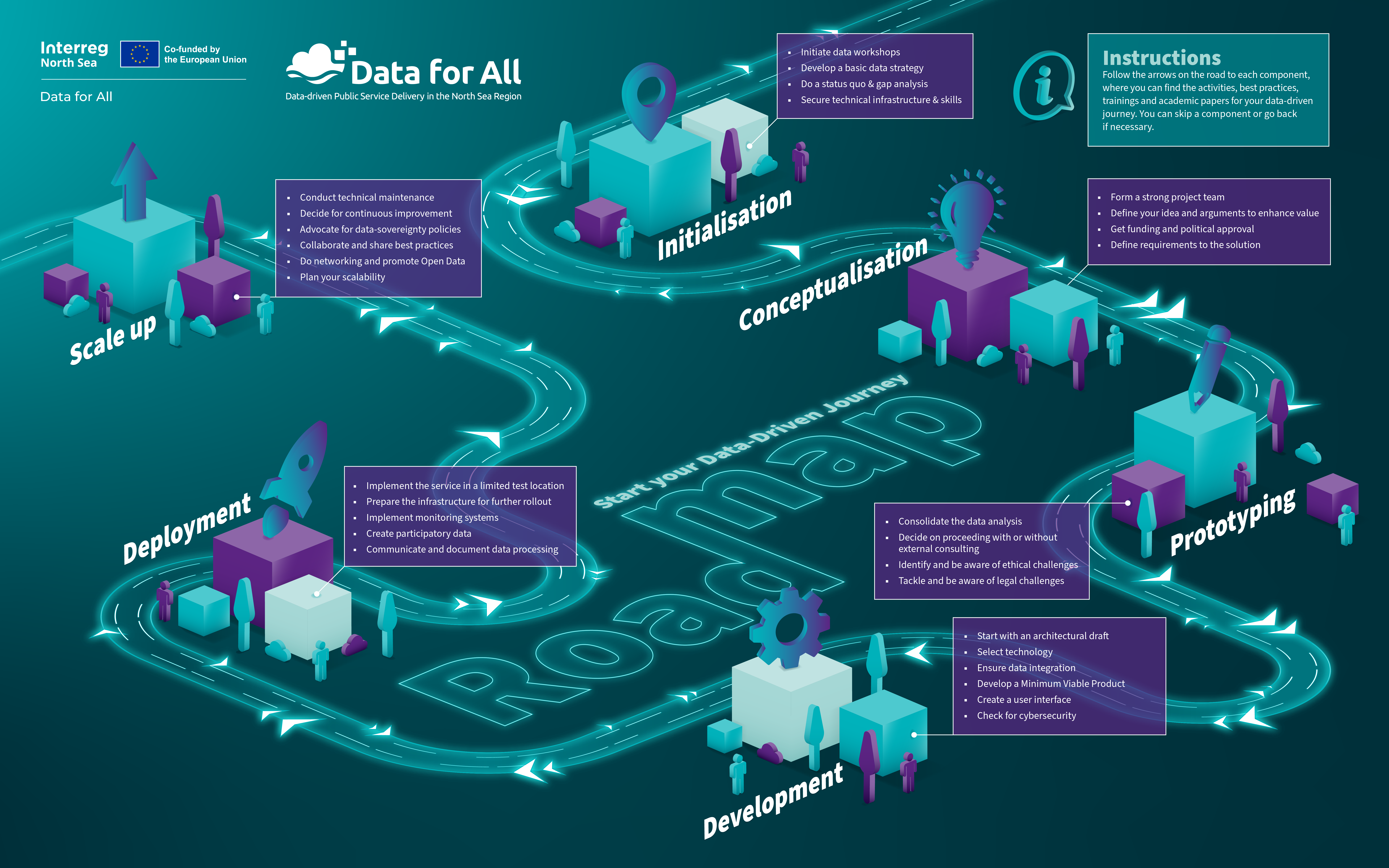
For each component you will find a subpage with all related information, including:
- Recommended activities
- "Go deeper" section providing insights on specific methods
- Academic papers from D4A Partners
- D4A Training Modules (Videos)
- D4A Best Practices
- Podcast episodes
By using the Roadmap, you will quickly gain theoretical knowledge through academic papers, deepen your understanding of data via training modules, replicate tested solutions and pilot experiences through best practices, and learn from international experts and academic partners through podcast episodes.
Don’t lose the North with our Expertise Compass!
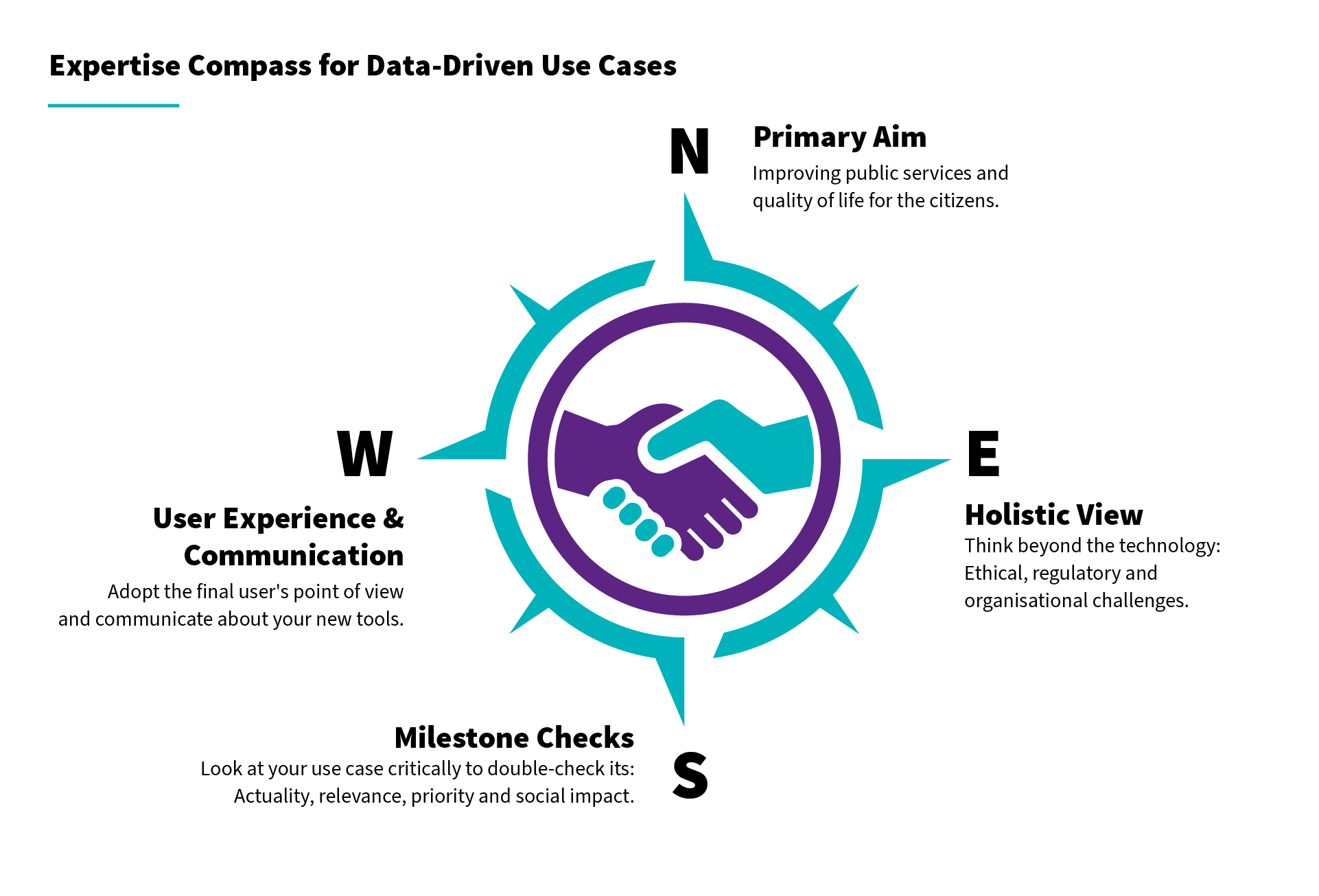
During your data-driven journey, it is crucial to keep in mind these small lessons learned from our project partner:
- When engaging in your data-driven use case, don’t focus only on the technical dimension. Be aware that challenges on ethical, regulatory, and organisational levels are equally important (D4A Knowledge Base).
- After each milestone, don’t hesitate to pause and look at your use case critically in order to double-check its:
- Actuality
- Relevance
- Priority
- Social impact
And when a decision needs to be made, focus on the primary aim behind data-driven use cases: improving public services and the quality of life for citizens.
Initialisation
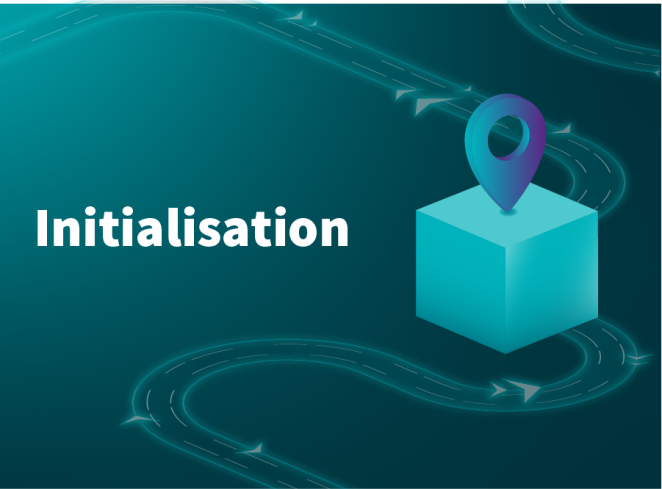
Initialisation & creation of a data-driven culture and framework in the public sector
The component “Initialisation” lays the foundation for a sustainable data-driven culture. It focuses on understanding your current situation, defining a clear strategy, strengthening core skills, and establishing the essential infrastructure. The goal is to provide the structure and direction needed to begin your data journey effectively.
- D4A Best Practice:
- D4A Podcast episodes:
- Municipalities as Data Stewards: Using Data for the Public Good, 03. April 2025
- Smart City: Smart life?, 31. July 2025
- "To go further" - Insights on a Method:
- D4A tested method: Takeaways from the Co-Creation Event in Veijle
- D4A Regional Data-Ecosystem Processflow by Intercommunale Leiedal
The Initialisation phase lays the foundation for a sustainable data-driven culture. It is about creating clarity, building alignment and ensuring the right conditions are in place before scaling. Key takeaways are:
- Assess and align the starting point: Understand your current data maturity and align stakeholders around a shared vision.
- Define a clear and realistic strategy: Connect data initiatives to business goals with a roadmap balancing quick wins and long-term priorities
- Build foundations around Skills, Culture and Infrastructure: Invest in data literacy, foster a culture of evidence-based decision-making, and establish the essential infrastructure for trusted, accessible data.
Conceptualisation
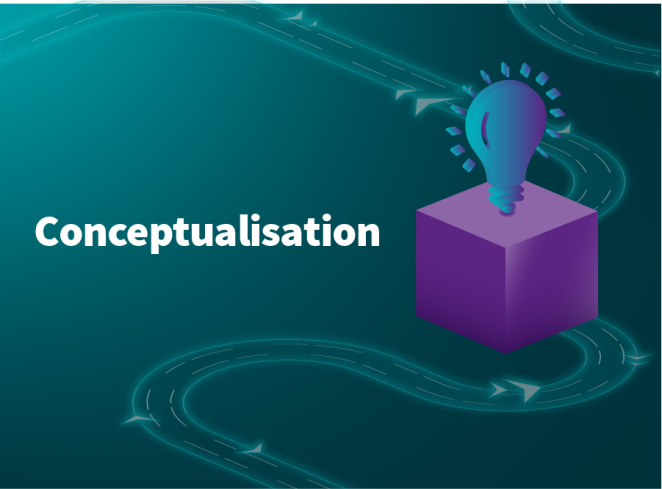
Conceptualisation & proof of value
The focus of the component Conceptualisation & proof of value lays in transforming your initial idea into a viable, value-driven project. It involves sharpening your concept, aligning it with organisational priorities, building the right team and securing buy-in. The goal here is to ensure that the project has strategic relevance, can be implemented in practice and receives the support it needs to move forward.
- D4A Training modules
- "To go further" - Insights on a Method:
- Guidebook from the European Commission on citizen engagement and participation formats
Insight into KPIs frameworks:
Resource in German: Räumliche Wirkungen von Smart-City-Maßnahmen
Resource in English: Smart city performance measurement framework CITYkeys
- Structuring an idea with the SMART Method
- D4A Regional Data-Ecosystem Processflow by Intercommunale Leiedal
Academic Papers: In our D4A knowledge base you will find more on the topic of data openness.
The conceptualisation phase focus on transforming your initial idea into a viable, value-driven project. Key takeaways include:
- They are specific key roles needed to form a strong project team for data-driven use cases.
- Defining the requirements for the solution guides the selection of technologies, platforms and data architectures.
- Creating a funding plan helps secure financial resources and political approval.
- Clearly defining your idea and the value it aims to create strengthens your argumentation.
- Involving citizens through engagement and participation processes increases the acceptance and impact of data-driven projects.
Prototyping
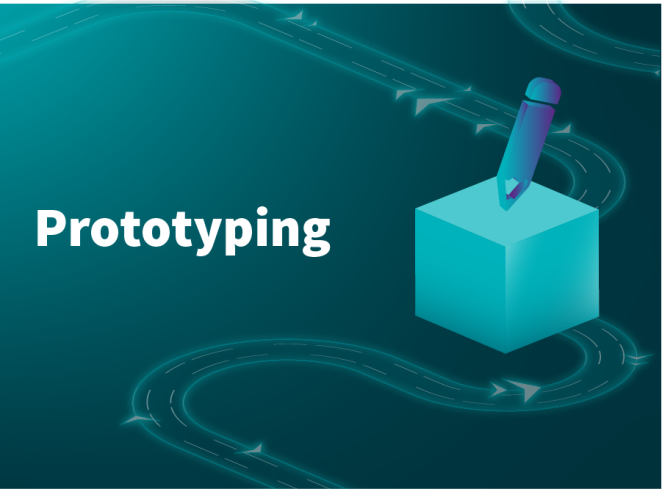
Decision on Prototyping & Proof of Concept process
With the focus on determining the best approach for testing and validating your data-driven journey, we suggest a guide to the “Prototyping & PoC process”. Initiatives must decide whether to develop prototypes internally, form collaborations with external consultants or explore alternative strategies. This can ensure that resources are allocated effectively and that potential operational challenges are addressed before moving forward.
- D4A Training Modules:
- VIVES: Introduction to ethics
- VIVES: What is ethics and why should you care about it
- VIVES: How you talk about technology is key
- VIVES: How to implement ethics in my own project
- VIVES: Data protection in data-driven municipalities
- Intercommunale Leiedal: Proof of Concept
- "To go further" - Insights on a Method:
- VIVES: Flash Cards on Data Ethics
- D4A Regional Data-Ecosystem Processflow by Intercommunale Leiedal
The Prototyping component is a crucial step, since the first ideas and work come into a first draft of the solution. During this phase it is important to check all boxes for mistakes and errors before continuing the journey. It might lead to going back a step to the conceptualisation component. Here are the key takeaways for Prototyping:
- Assess internal capabilities
- Estimate project complexity and timeline
- Estimate ressources available
- Include interdisciplinary and diverse stakeholder input during prototyping
- Conduct ethical impact assessments akin to Data Protection Impact Assessments (DPIAs)
- Collect only the necessary data to your specific purpose
- Define clear roles, responsibilities and accountability for data handling
Development
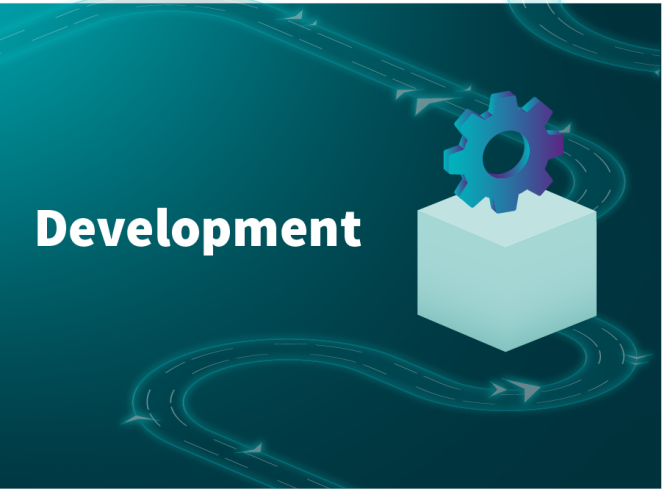
Development - Designing, building and preparing data-driven solutions
For the component of development, we identified six basic activities, which will help you designing and preparing data-driven solutions. From the system architecture and technology selection to the general testing of the Minimum Viable Product, get reliable information and get also inspired by the following D4A Training Modules on Interoperability challenges from University of Oldenburg and on Data Access from the University of Stavanger.
- D4A Best Practice:
- D4A Regional Data-Ecosystem Processflow by Intercommunale Leiedal
- D4A Solutions:
- D4A Training Modules:
- D4A Academic Papers:
In our D4A knowledge base you will find more on the topic of data openness, data management or data risks - "To go further" - Insights on a Method:
- D4A Regional Data-Ecosystem Processflow by Intercommunale Leiedal
In the Development component, strategic planning is turned into a functional, testable solution. It focuses on designing the technical foundations, integrating reliable data and building an MVP that can deliver early value.
The component is about making informed technology choices, ensuring interoperability and validating the solution with real users before scaling
- Define the architecture: Align system components and data flows with existing infrastructures, ensure interoperability.
- Choose the right technology: Select tools that fit your ecosystem, ensure data sovereignty and support long-term sustainability.
- Integrate data securely: Standardise, document and connect datasets.
- Build a focused MVP: Deliver the simplest version that solves the core problem and refine it through early feedback.
- Design a user interface: Align UI/UX with organisational design and ensure it fits the data structure.
- Test and secure the solution: Validate usability, confirm compliance and implement essential cybersecurity measures.
Deployment
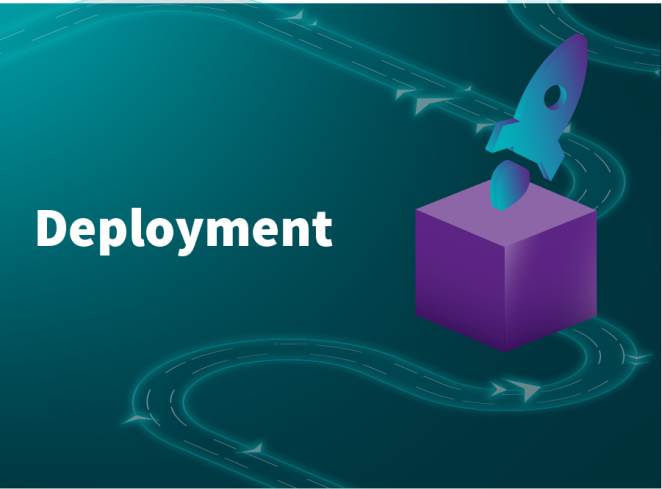
Deployment – Rolling out solutions, ensuring functionality and user experience
Deploying data-driven development solutions is a key component where strategy meets execution. A successful deployment ensures that solutions move beyond the pilot stage to “the real-world”, delivering measurable value to users and communities.
- "To go further" - Insights on a Method:
- D4A Regional Data-Ecosystem Processflow by Intercommunale Leiedal
- D4A Training Modules:
- Kungsbacka: Introduction to Open Data and its Value
- University of Gothenburg: Open Data in the municipal context
- University of Gothenburg: Challenges of Open Data in the municipal context
- University of Gothenburg: Values of Open Data in the municipal context
- Intercommunale Leiedal: Data project management flow
- D4A Academic Papers:
Deploying data-driven development solutions is a key component where strategy meets execution. A successful deployment ensures that solutions move beyond the pilot stage to “the real-world”, delivering measurable value to users and communities.
- First test your data solution in a limited controlled environment
- Prepare the data infrastructure for a broader rollout
- Check if data is sensitive or can be shared (Open Data)
- Implement a robust monitoring system and involve communities
- Enhance data literacy
Scale Up

Support, Maintenance and Scale Up
To ensure the long-term success and impact of a data solution, it is essential to plan for its support, maintenance, and scalability. These three pillars form the operational backbone of any data-driven initiative, ensuring stability, performance, and continued relevance as data volumes and user demands increase.
- "To go further" - Insights on a Method:
- D4A Regional Data-Ecosystem Processflow by Intercommunale Leiedal
- D4A Training Modules:
- D4A Podcast Episodes:
- Municipalities as Data Stewards: Using Data for the Public Good, 3 April 2025
- Circular Economy: Transforming regional habits, 14 August 2025
- D4A Knowledge Base:
This component focuses on how a solution should not only work in only one use case but should be developed with replication in mind.
- Conduct technical maintenance including a disaster recovery plan
- Advocate for data-sovereignty policies on all levels
- Engage and share with other municipalities, local/regional stakeholders and citizens for potential scale up projects
